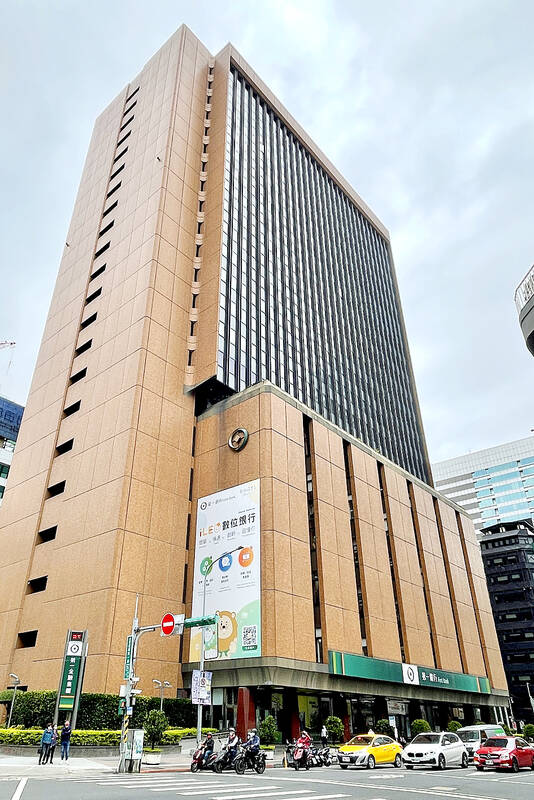State-run First Financial Holding Co (第一金控) yesterday lowered its loan growth target for this year from 5 percent to 4 percent after Taiwan’s GDP growth and exports fared weaker than expected.
The conglomerate revised down the target even though its net profit last quarter grew 34.1 percent year-on-year to NT$6.63 billion (US$215.5 million) on the back of currency swap gains, First Financial investment relations head Anne Lee (李淑玲) said.
The results translated into earnings per share of NT$0.50.

Photo: George Tsorng, Taipei Times
Profit momentum linked to currency swaps might be sustainable this year, thanks to interest rate differentials between the local currency and the US dollar, although it is widely believed the US Federal Reserve would halt rate hikes this month, Lee said.
The bank-focused conglomerate raised projections for swap gains to NT$12 billion this year, from its previous forecast of NT$9 billion, after posting NT$4 billion in gains in the first quarter, Lee said.
However, Taiwan’s disappointing economic and export performance warranted a downward revision for the loan book’s growth trajectory, as companies are likely to turn conservative about capital spending and business expansion amid the economic uncertainty, Lee said.
First Financial now expects a 4 percent increase in loans to small and medium-sized enterprises, and organic growth of 3 percent in mortgage operations, Lee said.
Inflation and interest rate hikes have prompted corporate and retail customers to tighten their belts, the official said.
Foreign currency lending would advance by 6 percent, from the 9 percent it projected three months earlier, Lee said.
Fee income would rise by 5 to 6 percent, driven by its wealth management business, as high yields would help boost investment appetite after unease over bank failures in the US and Europe settles, Lee said.
Profit contributions from overseas and offshore operations shrank to 23.61 percent, from 37.02 percent in the preceding quarter, dragged by credit losses in connection to medical care services and real-estate developers in Europe, Lee said.
The official said she is not particularly worried about more bad loans as First Commercial Bank (第一銀行) has set aside higher provisions than legally required.
On the contrary, the lender might see a bad loan recovery, Lee said.
First Financial lowered its dividend payout ratio to 51.3 percent of its earnings last year, compared with an average of 70 percent in the past few years.
Lee said the retreat had much to do with the negative value of its other comprehensive income (OCI) account.
The situation should improve when the OCI account returns to positive territory and profitability puts up a robust showing, she said.

Hong Kong authorities ramped up sales of the local dollar as the greenback’s slide threatened the foreign-exchange peg. The Hong Kong Monetary Authority (HKMA) sold a record HK$60.5 billion (US$7.8 billion) of the city’s currency, according to an alert sent on its Bloomberg page yesterday in Asia, after it tested the upper end of its trading band. That added to the HK$56.1 billion of sales versus the greenback since Friday. The rapid intervention signals efforts from the city’s authorities to limit the local currency’s moves within its HK$7.75 to HK$7.85 per US dollar trading band. Heavy sales of the local dollar by

Taiwan Semiconductor Manufacturing Co’s (TSMC, 台積電) revenue jumped 48 percent last month, underscoring how electronics firms scrambled to acquire essential components before global tariffs took effect. The main chipmaker for Apple Inc and Nvidia Corp reported monthly sales of NT$349.6 billion (US$11.6 billion). That compares with the average analysts’ estimate for a 38 percent rise in second-quarter revenue. US President Donald Trump’s trade war is prompting economists to retool GDP forecasts worldwide, casting doubt over the outlook for everything from iPhone demand to computing and datacenter construction. However, TSMC — a barometer for global tech spending given its central role in the

The Financial Supervisory Commission (FSC) yesterday met with some of the nation’s largest insurance companies as a skyrocketing New Taiwan dollar piles pressure on their hundreds of billions of dollars in US bond investments. The commission has asked some life insurance firms, among the biggest Asian holders of US debt, to discuss how the rapidly strengthening NT dollar has impacted their operations, people familiar with the matter said. The meeting took place as the NT dollar jumped as much as 5 percent yesterday, its biggest intraday gain in more than three decades. The local currency surged as exporters rushed to

PRESSURE EXPECTED: The appreciation of the NT dollar reflected expectations that Washington would press Taiwan to boost its currency against the US dollar, dealers said Taiwan’s export-oriented semiconductor and auto part manufacturers are expecting their margins to be affected by large foreign exchange losses as the New Taiwan dollar continued to appreciate sharply against the US dollar yesterday. Among major semiconductor manufacturers, ASE Technology Holding Co (日月光), the world’s largest integrated circuit (IC) packaging and testing services provider, said that whenever the NT dollar rises NT$1 against the greenback, its gross margin is cut by about 1.5 percent. The NT dollar traded as strong as NT$29.59 per US dollar before trimming gains to close NT$0.919, or 2.96 percent, higher at NT$30.145 yesterday in Taipei trading